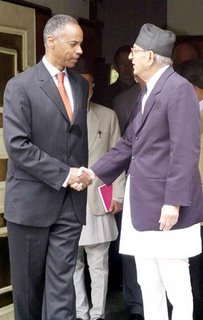KATHMANDU, Oct 31 -
"A breakthrough acceptable to the government, the Maoists and also the international community has been reached," said a leader involved in the negotiations.
According to the understanding, all of the rebels' weapons will be stored and locked up in the respective cantonments where the combatants are cantoned, before the Maoists join the interim government. The Maoist leadership will keep the keys to the stores. But the UN will install fixed cameras to monitor the storage and will have the right to make inspections whenever it desires.
The deal also has an element of reciprocity: Equal number of weapons belonging to the Nepali Army will be stored and locked up at the barracks and the UN will inspect these as well. Until the constituent assembly elections takes place, both the Maoist combatants and Nepali Army personnel will be confined within their respective cantonments and barracks.
A cabinet sub-committee, which might potentially evolve into a separate ministry over time, will be formed to take up the issues of restructuring and reform of the Nepali Army, integration of the Maoist combatants into the army and reform of the whole security system. It will also develop a comprehensive plan to "right-size" the army and to rehabilitate the extra combatants from both sides into society.
The breakthrough on arms management came following a similar breakthrough on political issues last week. "Now the top level leaders will review the whole package of agreements and a 'summit meeting' will make the agreements public in a day or two," said the leader.
The leader, however, said the CPN-UML insisted even today that the future of the monarchy should be decided by a national referendum and the cut-off year for settling the citizenship dispute should be 1979. "But we think the UML will give up its stance eventually."
Commission for state restructuring
The parties and the Maoists have also agreed to form a powerful commission that will study and explore the options and modalities on restructuring the Nepali state to make it more inclusive and progressive.
Political agreements
On the political front the leaders have already agreed to form a 23-member interim government in which the Nepali Congress, CPN-UML and the Maoists will get five ministries each. The rest of the ministries will go to the Nepali Congress (Democratic) and fringe parties.
Similarly, the interim legislature will have 300 members with more or less equal representation for the NC, the CPN-UML and the Maoists. The NC, CPN-UML and other parties will nominate all the sitting lawmakers in the House of Representatives and the upper house to the new legislature.
Likewise, the Constituent Assembly (CA) will have 425 members. 205 members will be elected from the current constituencies and the parties will nominate 204 members in proportion to the popular vote they garner in the CA elections. The prime minister will nominate the remaining 16 members. The parties have agreed to decide the future of the monarchy through the first meeting of the constituent assembly. Posted on: 2006-10-30 22:06:00 (Server Time)






 The constitution of 1990 could not represent women, ethnic minorities and backward classes, said the Speaker stressing the fact that there is no alternative to elections to the Constituent Assembly (CA).
The constitution of 1990 could not represent women, ethnic minorities and backward classes, said the Speaker stressing the fact that there is no alternative to elections to the Constituent Assembly (CA).



